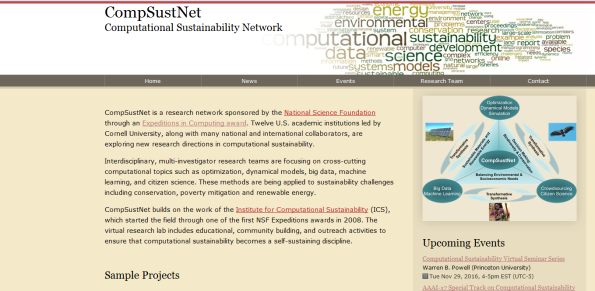Computational Sustainability Activity
 The Computational Sustainability group is still going strong. Founded in 2009 by a group led by Carla Gomes of Cornell University, the “interdisciplinary research network” received renewed funding from the US NSF earlier this year. The group held its fourth conference in 2016 and will be active in the upcoming AAAI (Association for the Advancement of Artificial Intelligence) meetings. See their events page for more information. And here is a greenOR post about the first CompSust conference in 2009.
The Computational Sustainability group is still going strong. Founded in 2009 by a group led by Carla Gomes of Cornell University, the “interdisciplinary research network” received renewed funding from the US NSF earlier this year. The group held its fourth conference in 2016 and will be active in the upcoming AAAI (Association for the Advancement of Artificial Intelligence) meetings. See their events page for more information. And here is a greenOR post about the first CompSust conference in 2009.
An upcoming webinar by Warren Powell of Princeton University on Tue Nov 29, 2016, 4-5pm EST looks like a great opportunity to get an overview of quantitative sustainability problems and how they are being addressed by various communities. Here are the title and abstract:
Title: A Unified Framework for Handling Decisions and Uncertainty In Energy and Sustainability
Abstract: Problems in energy and sustainability represent a rich mixture of decisions intermingled with different forms of uncertainty. These decision problems have been addressed by multiple communities from operations research (stochastic programming, Markov decision processes, simulation optimization, decision analysis), computer science, optimal control (from engineering and economics), and applied mathematics. In this talk, I will identify the major dimensions of this rich class of problems, spanning static to fully sequential problems, offline and online learning (including so-called “bandit” problems), derivative-free and derivative-based algorithms, with attention given to problems with expensive function evaluations. We divide solution strategies for sequential problems (“dynamic programs”) between stochastic search (“policy search”) and policies based on lookahead approximations (which include both stochastic programming as well as value functions based on Bellman’s equations). We further divide each of these two fundamental solution approaches into two subclasses, producing four classes of policies for approaching sequential stochastic optimization problems. We use a simple energy storage problem to demonstrate that each of these four classes may work best, as well as opening the door to a range of hybrid policies. I will show that a single elegant framework spans all of these approaches, providing scientists with a more comprehensive toolbox for approaching the rich problems that arise in energy and sustainability.
